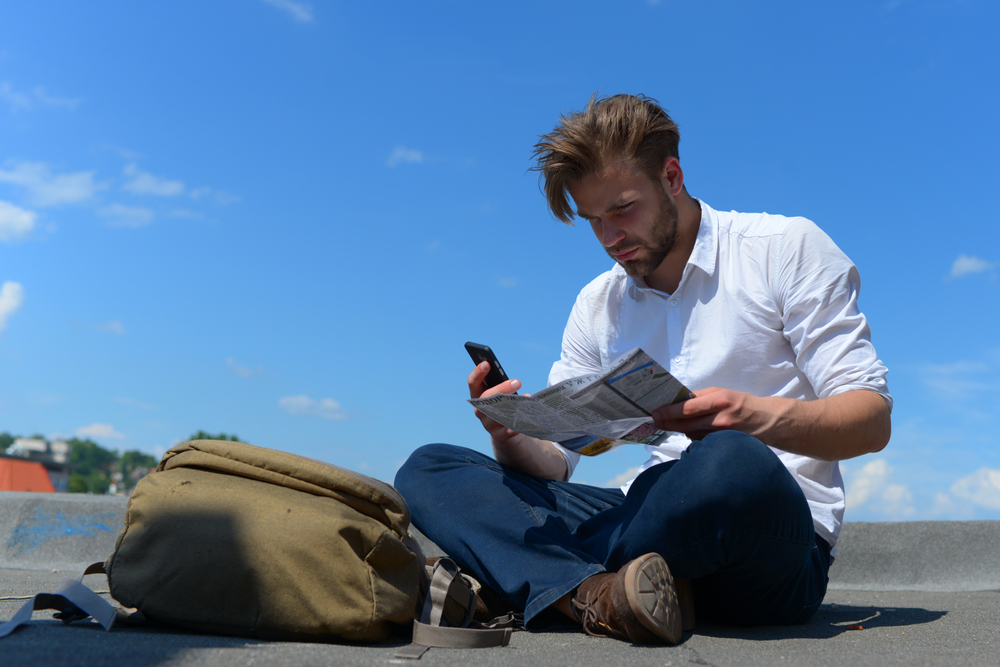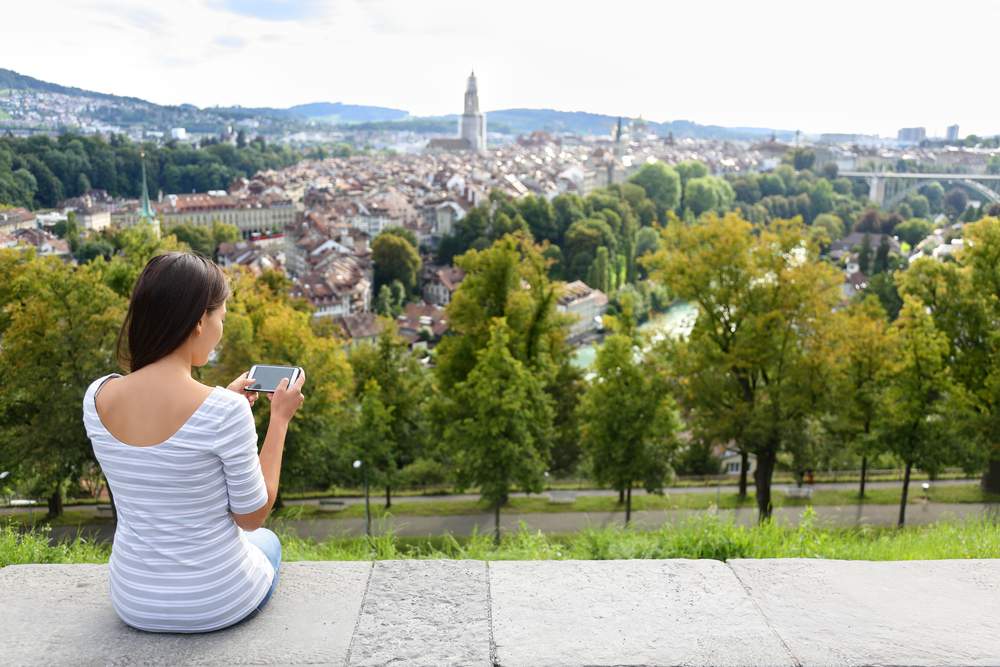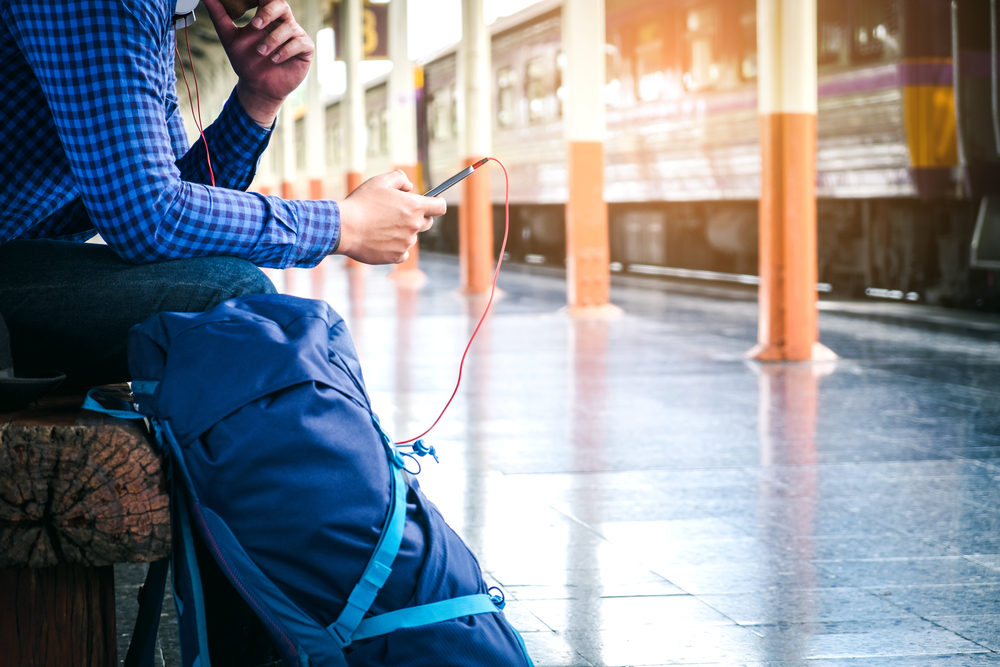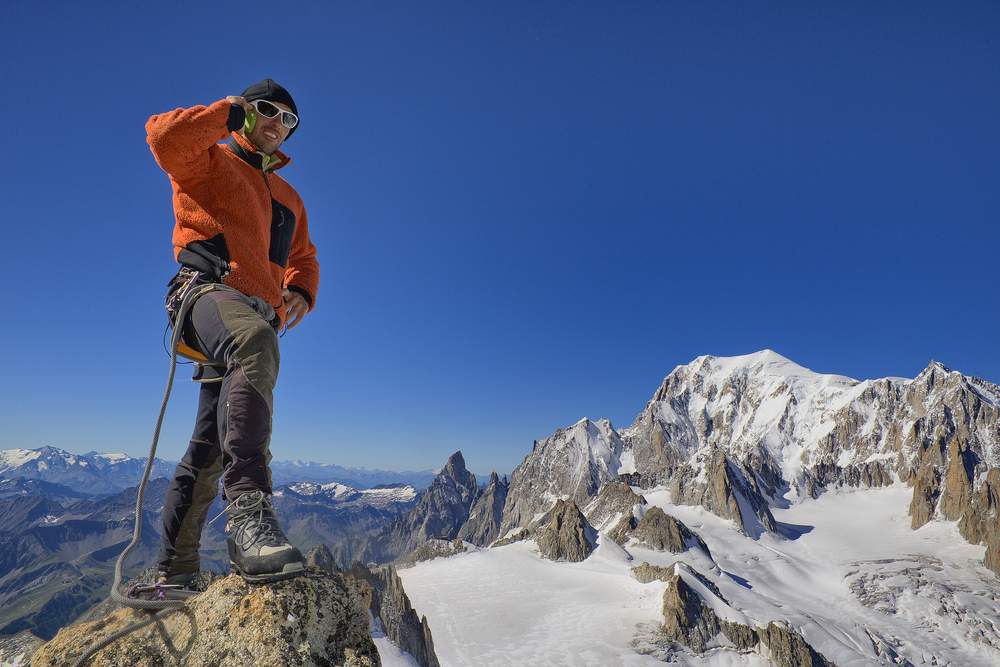In 2019, there’s no shortage of ways to stay connected while on the road. Undeniably, the ease of connection is one of the modern conveniences that now allows more people than ever to consider stepping out into the world for an extended period.
Keeping in touch with mom is as easy as a Skype call. Encouraging others to try long-term travel on for size is as easy as sharing a photo and status update on social media. Heck, even making money as you go now requires little more than a laptop.
There is no doubt that technology has changed the landscape and the accessibility of travel. But has the constant connection that comes from an over-reliance on technology begun to have a negative influence on the journey?
Have we become so consumed with sharing and checking in that we are losing something along the way?
Should we forego the gadgets and travel more simply?
The constant feed
 Most modern-day travelers, if they are being honest with themselves, will likely admit that they have spent a fair amount of time editing photos, planning status updates, and wording emails “just so.” When everything we share makes its way into the newsfeed of every friend we have ever known, the human need to defend our own choices and embellish the truth just a little takes on a life of its own.
Most modern-day travelers, if they are being honest with themselves, will likely admit that they have spent a fair amount of time editing photos, planning status updates, and wording emails “just so.” When everything we share makes its way into the newsfeed of every friend we have ever known, the human need to defend our own choices and embellish the truth just a little takes on a life of its own.
We select what we share with the precision of a surgeon.
We make sure nothing is too offensive or too startling so that eyes that belong to family members will not fall upon information that makes them fear our certain demise. However, there is a balance, and we must also share things that make us look daring, happy, and basically awesome lest that friend from fifth grade who sent you a friend request last week thinks you are bum without direction.
High-speed internet is consistently ranked as one of the must-haves for many long-term travelers.
If we don’t post about our adventures the same day they happened, we wonder if we have missed our opportunity. If we can’t send off an email to dad within 24 hours of the last one, we are certain he will think we are dead.
Unfortunately, many of us are probably right. We are not the only ones who have been affected by a constant reliance on technology. Our family and friends expect instant updates as if we were living next door. They get news, weather, and entertainment with a tap of the finger – no waiting required.
We all have a constant flow of information literally at our fingertips, and when we travel, our family wants that constant flow of info from us as well. There is no differentiation between being home and being abroad when it comes to connection.
The assumption is that any sane and safe person would check in regularly and quickly, and if you do not, well then you must be kidnapped or dead.
Your first thought may be to brush this off as something that happens to newbies; something to laugh off. But is it? If you really think about it, I bet you can identify more than a few recent, personal examples of what we are talking about here. I know I can.
I will admit that panic has hit me more than once when I realized I couldn’t make contact as promised because of weak or nonexistent internet. Culturally speaking, we are in constant demand for information from any and all aspects of our lives. When that demand cannot be met, there is often an initial panic over what the ramifications will be.
Our modern day culture is obsessed with the instant gratification of this constant flow of information. We struggle to slow down. We feel guilty for relaxing – surely there is something we “should” be doing.
One of the biggest benefits of long-term travel is the time and space to just be and the freedom to immerse oneself in new experiences without everyone back home watching over your shoulder.
Now we move at the speed of light, eagerly looking for the “likes” that follow our daily posts about what we are up to. Our families check their email boxes two, three, five times a day, not wanting to miss an update. Our expectation of instant connection is creating a travel environment where we feel the need to do, see, and experience it all- or to at least make a social media page that makes it seem like we did- and to share it all in a way that screams, “I am having the time of my life! (but not in any way that endangers my health of well being, mom!)”
When is the last time you visited an iconic landmark and took fewer than ten photos? When is the last time you looked down at your camera and didn’t immediately identify the picture that would become your new profile picture?
When is the last time you shared an important moment in your journey without worry about who would see it and what they would think? Is the ability to just exist something that is becoming a thing of the traveling past? Are we so tied to speed and instant gratification that we are failing to really exist in the time and space we are in?
Forgetting to get lost
 Getting lost is one of the scariest and most rewarding aspects of travel. When you find yourself completely and utterly unsure of where you are, panic can set in. But then some kind woman walks by and asks if she can help you find something. The next thing you know, not only are you surprised to find that your hotel is less than three blocks away but you also have an invitation to dinner tonight with a new friend.
Getting lost is one of the scariest and most rewarding aspects of travel. When you find yourself completely and utterly unsure of where you are, panic can set in. But then some kind woman walks by and asks if she can help you find something. The next thing you know, not only are you surprised to find that your hotel is less than three blocks away but you also have an invitation to dinner tonight with a new friend.
This isn’t fantasy, it happens all the time.
Getting lost is one of the biggest gifts of travel.
It requires you to practice your coping skills and problem solve. But if we are all carrying around GPS systems, can we ever really get lost? If we are constantly looking down at a tiny arrow on a screen, are we enjoying the view as we go? Are we even learning about where we are and figuring out the keys to navigating in this new space? And what about mom, back home, wondering why you haven’t checked in in 12 hours? Will she be worried? Will she panic if you tell her you got lost?
There really isn’t a need to even debate whether technology offers benefits in these instances – it does. But it’s also possible that we are accidentally allowing one of the best parts of travel to become a thing of the past.
Not only are we limiting our own ability to get lost, we are creating an arena where every new traveler has to fight for the opportunity to get lost in their own right. Not just physically, but mentally.
Arriving in a new place and discovering things is fun. It helps us feel brave and more connected to where we are. It also requires that we interact with locals and learn from them. It requires a certain amount of bravery and openness.
The new phenomenon of having every nook and cranny exposed on social media before the new traveler arrives limits their need to explore. Yes, they will know where the best burger in town is and where to find the cheapest beer. Those things can be valuable pieces of information, but they are also bits of information that are fun to figure out on your own!
There really isn’t a need to even debate whether technology offers benefits in these instances- it does. But it is also possible that we are accidentally allowing one of the best parts of travel to become a thing of the past.
Have you noticed a trend lately that new travelers seem to be underwhelmed by new experiences and iconic landmarks? That they seem less affected by beautiful or horrifying sights? I have.
Gorgeous views of the Eiffel Tower, far away Thai beaches, and Indian weddings grace the internet. But somehow when new travelers hit the scene themselves, they feel like maybe they’re missing something.
But they aren’t missing anything. Rather, they are suffering from an over saturation of information on a place, which makes them feel like they have already seen it and maybe even seen it in a more beautiful light, cooler filter, or richer description than what they are experiencing first hand. I’ve noticed a detachment from the beautiful and harsh realities of our world. I’ve even caught myself a few times not responding authentically to a situation because I heard so much about it before I arrived. For some, children begging fails to evoke any strong emotion and a sunset in El Salvador fails to impress. It’s unfortunate at best and very, very sad at worst.
Maybe we don’t stop sharing all the little tips and tricks – there’s no need to reinvent the wheel here – but maybe we could share a little less in an effort to keep the element of exploration fresh for new travelers.
Maybe travelers who are new to the scene could also try to resist the urge to learn everything about a new place before they arrive.
A connection that limits our connections

Keeping connected with everyone back home is a long-term traveler’s dream. You can see your newborn niece moments after she is born, Skype into a birthday party for your best friend, keep abreast of news from back home, or social media stalk your little sister. It can be wonderful.
But there are limits to that connection.
In any number of hostel dorm rooms across the globe, there are people, sitting in corners, interacting virtually, not connecting with those people who are right in front of them. They will leave tomorrow or the next day, not even sure what country the person in the bed next to them is from. They will share photos online and forget to share stories with their bunkmates. They will rush through dinner in the shared kitchen, head back to their corner, and scroll through their newsfeed some more. I’m not being pessimistic. I am just sharing exactly what I saw in every single hostel I visited in the last year.
When you head out to travel, life goes on back home without you. Let it….It’s a beautiful thing actually because returning and feeling a little like an outsider helps highlight all the ways in which you have grown and developed in your time away.
In our never-ending effort to straddle two worlds, we sometimes forget to make new connections with people who are having similar life experiences in real time. We will likely return home at some point, even for a short visit. You may never have the opportunity to make a connection with that musician sitting next to you again.
It may not be a popular thought but when you head out to travel, life goes on back home without you. Let it.
No amount of social media connection is going to make you feel a part of the inside jokes and shared glances when you return. It’s a beautiful thing actually because returning and feeling a little like an outsider helps highlight all the ways in which you have grown and developed in your time away. You have something new to bring to the table- something different.
Sometimes though, the constant connection makes bringing “new” energy to the table challenging. When we returned from a year abroad, no one asked us how our year had gone. No one really felt the need to ask us about the people we met, the places we went, or the things we saw.
Why? Because they thought they knew it all based on our blog and social media feed. In reality, we had only shared a tiny snippet of our experiences. We didn’t have the time to share it all! We were left feeling very oddly out of place. We wanted to share with interested people but we had accidentally made everyone feel like they had been traveling with us all along.
Those social connections while we traveled didn’t completely serve us upon our return. On the other hand, the connections we made in real life with like-minded travelers, vagabonds, nomads, traveling families, business owners, visionaries, and open-minded individuals continue to add richness and benefit to our lives every day.
Balancing act
 So, do we ditch the technology and strive for a simpler way of traveling? Do we refuse to check in with family and friends and delete our social media accounts? Probably not.
So, do we ditch the technology and strive for a simpler way of traveling? Do we refuse to check in with family and friends and delete our social media accounts? Probably not.
Let’s bring some intentionality to our use of technology and be aware of the potential pitfalls of constant connectivity. Don’t throw that smartphone in the trash just yet – maybe just turn it off more often.
My proposal is simple. Regular, announced social media fasts while traveling. Go ahead and tell everyone you will be taking a short break from social media so that no one panics, and then do it. For added interest, take note of how long it takes your brain to stop thinking in terms of status updates.
Once I realized that some of my most peaceful travel experiences came amidst a severe shortage of adequate internet connectivity, I started intentionally ditching the virtual connections every so often. Sure, some people were nervous over not hearing from me for a few days, but the way I see it, we humans have created this insatiable need for connection (and the false sense of security that connection brings), and therefore we are fully capable of making the choice to temper that need. I disconnect not only for my own sanity but as a secondary means of communicating to my social circle that the world does not end when emails cannot be sent for 24 hours, and status updates do not actually keep anyone “safe” on the road.
I’m not the only one who’s tried a social media fast. Kate Arends of Wit & Delight has written a compelling piece about her own fast and she brings up some further points for consideration, including some thoughts on the link between mood and technology.
Is technology affecting our moods? Could that effect be ruining our real life experiences? I don’t know but I certainly think it’s worth asking the questions and exploring the answers.
There is a way to balance the benefits and the pitfalls of technological advances. The benefits are pretty clear since we all use technology almost every day. But you still aren’t going to find what you’re truly looking for on your journey in a newsfeed. Being more aware of the pitfalls of technology can create an environment where making different choices can bring it all back into balance.
Have you fasted from social media while traveling? Did it change the real life experience in any way?
Read More:
- How to Connect With Locals While Traveling
- Six Risks to Take That Will Improve Your Travels (And Your Life)
- 30 Places & 5 Ways to Learn More Through Travel